Follansbee Review, Wednesday, June 10, 1964, p. 1. (According to W.S. Baldwin, General Commercial Manager of C.& P. during main address for St. Anthony High School’s final Commencement.)
May 1918 – Italian – American Day Observed
The third anniversary of the entry of Italy into the Great War on the side of the Western Powers was celebrated in Follansbee. A street parade and series of public speeches occurred under the auspices of the Italian community. The parade featured the local city band (see photo) and an Italian band followed by the Garibaldi – Italia Redenta Society of over 200 strong marching behind flag bearers carrying their beautiful silk Italian flags and the Lodge banner. Also participating in the celebration were Red Cross ladies in uniform, school children and others who marched through town and back to the public park at the intersection of Penn and Main streets. Addresses were given by Joe Zago, president of the Garibaldi Society, who made a brief address introducing the rest of the speakers: William and Gilbert Follansbee, Rev. F.P. Patrona of the Italian Mission of the Presbyterian Church, and Rev. Father Parascandola of St. Anthony Church. The speeches were in Italian and English. The ceremonies ended with a group of little girls of Italian and Romanian parentage in their ethnic clothing singing songs.
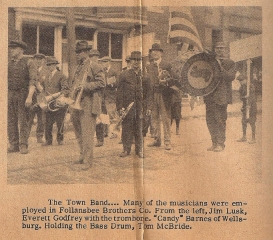
City band. Photo courtesy of former Mayor Tony Paesano, Follansbee.
- Follansbee Review, “Italo-Amerian Day Observed,” May 24, 1918.
May 1918 – Chief Of Police Addison Barnes Commits Suicide
Addison Barnes, in a despondent state, fired a bullet into his head. He was found 4 hours later by his sons. The background behind this story began when the Good Citizenship Committee called for Barnes’ discharge based on claims of alleged drunkenness and incapacity in office. Accusations were made that he ignored frequent violations of anti-liquor laws. It was said that two nights a week a truck from Steubenville loaded with booze drove down Mill alley and distributed its load. City officials were accused of ignoring the town’s poker joints, speakeasies, and booze smuggling in private autos. “Does the Mayor and Council control the city or is the Chief of Police supreme?” Friends of Chief Barnes petitioned for his reelection. His champions, Peter Adler and Arthur McCort, filed a petition with the City Council, signed by 134 citizens. James M. Powell was placed on the ballot representing the anti-liquor faction.
The shock of Barnes’ death saddened the city. He had been in office for 11 years always being re-appointed by the Council. A new city charter in 1917 made the position an elective one. Mr. Barnes had not been in good health and was crippled by rheumatism. Following his death, John Stephens was elected as the next Chief of Police by a large majority over James M. Powell, the candidate for the Good Citizenship Committee.
The funeral of Addison Barnes was one of the largest ever to occur in Follansbee. Rev. A. B. Miller of the People’s Baptist Church of Wellsburg delivered the funeral sermon at the Barnes residence. “The casket was banked with beautiful floral pieces from city council, Eagles Lodge, and other organizations and friends.” The huge number of citizens in attendance was a grand tribute to Mr. Barnes, who was Chief of Police for eleven years. His remains were conveyed in an all auto cortege led by members of the Eagles fraternity, and buried at Ebenezer Cemetery out Cross Creek.
- Follansbee Review, “Shall the Law be Enforced in Follansbee.?” April 5, 1918.
- Follansbee Review, “Chief’s Friends Petition for Recall Election,” April 12, 1918.
- Follansbee Review, Chief of Police Barnes, in Despondent State, Fires a Bullet …,'” May 3, 1918.
- Follansbee Review, “Mr. Barnes’ Funeral,” May 10, 1918, p. 1.
April 1918 – A Mother Of Follansbee Dies
The entire community was shocked by the sudden death of Martha Mahan. In 1902 Her husband Herman and his brother Thomas Mahan sold orchards lands to the Follansbee Brothers upon which the city of Follansbee was built.
Martha was stricken with apoplexy, falling unconscious until her death. Her maiden name was Martha Elizabeth Everett. She was born in Wellsburg, July 5, 1863, and resided in Brooke County all of her life, ”the last number of years in this place, having been one of the founding Mothers of Follansbee.”
“Those left to mourn her were her husband, Herman B. Mahan, and their two sons, Herman Lee who was with the Evacuation Hospital Corps in France, and Walter at home; three sisters and one brother: Mrs. Bracken of Loraine, Ohio; Mrs. T. H. Caldwell, Miss Leola Everett, and J. Lee Everett, of Wellsburg.” Her son, Walter “Red” Mahan, later became an All American Football player at WVU. Interment was private at Brooke Cemetery in Wellsburg.
- Follansbee Review, “Mrs. Herman Mahan Passes Away,” Apr. 5, 1918, p. 8.
March 1918 – Examples Of Follansbee’s Patriotism
The Karnath family of Polish descent was supporting the nation by giving four sons to the service, Frank, John, Samual, and Joseph. Andrew Sabol and three of his brothers went together to the service. The Daily Lunch, a Greek restaurant, hung up a flag with stars for each of their employees who were in the service, George Mitchell, William Zibelas, Leo Huth, and Mick Cornelius. The Knights of Pythias Lodge had 30 men in different branches of Uncle Sam’s service, 15% of its 200 members. The Follansbee Brothers Tin Mill suspended operations during time of parades honoring men leaving for the service. Four Follansbee boys wrote home from Camp Lee: “We are the boys from Follansbee, we enjoy life in Camp Lee, we also belong to the infantry. We are well trained and we can lick Germany. This is one Camp Lee favorite song. Where do we go from here boys to slip the pill to Kaiser Bill and make him shed a tear. And when we will see the enemy we will shoot them in the rear. Oh boys — Oh joys, where do we go from here?” Signed, Frank J. Karnath, Howard McCarl, Frank Ross, and Salvatoro Stillitano.
- Follansbee Review, “A Patriotic Family,” March 15, 1918.
- Follansbee Review, “Four Follansbee Boys Send Message…,” February 1, 1918.
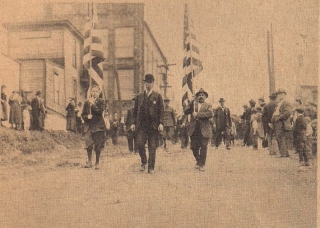
A parade down Main Street in Follansbee sent the boys off to war circa 1917. Photo courtesy of former Mayor Tony Paesano, Follansbee.
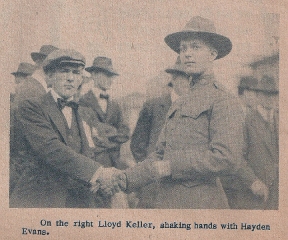
Photo courtesy of former Mayor Tony Paesano, Follansbee.
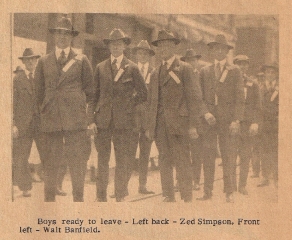
Follansbee boys leaving for WWI, circa 1917. Photo courtesy of former Mayor Tony Paesano, Follansbee.
Feb. 1918 -Italians Support War Effort Back Home
The Lodge of Giuseppe Garibaldi — Italia Redenta contributed money to support the relief of Italian soldiers and expressed their love of their native land. Committees were organized to raise the money. Among the prominent Follansbee Italian citizens who gave their support were Signori Joe Zago, Frank de Franch, Joe Bonitatibus, Antonio Cocco, Berardino Fransoglio, and Vito Paesano. Other Italian colonies in Mingo and Wellsburg also sent their contributions through the Italian Ambassador in Washington, D.C.
Follansbee’s Italian boys joined the Italian Army. A list of military service men serving in the US or Allied forces up to January 24, 1918 was printed in the city newspaper. Since Italy was at war with Austria-Hungary, Italian-Americans had the choice of returning to fight with the Italian army or serving with their new country. Many chose to join the Italian forces to fight against Austria in northern Italy. Among the native Italian boys who served in the Italian army were the following: (All names spelled as listed by the paper.)
Giuseppi Alak
Sunte Allandazo
Frank Librante
Frank Nicastro
Nicolo Groce
Gaetano Croce
Rocco DeMaria
Emilio Faenzi
Pietro Ferelli
Flaviano Ginolite (Killed in Action)
Frank Nicastro
Antonio Roco
Giuseppe Stupa
Flaviano Ginolite (Killed in Action)
Angelo Terbuiani
Luigi Trebinani (Killed in Action)
Antonio Verne
Pete Vanni
Charles Vanni
Follansbee Review, February 8, 1918.
Follansbee Review, “Enlisted & Drafted Men..,” Feb. 1, 1918, p.5.
Sep. 14, 1917 – Dedication of the Free Methodist Church
Dedication of the Free Methodist Church on South Virginia Avenue occurred on Sunday, September 23. Rev. A. D. Zahniser, general conference evangelist, delivered the opening address. This church building is still standing today on south Virginia avenue very near State Street. The Follansbee Review reported that earlier congregational meetings occurred in a former school-room on State street, that had a capacity 80 for Sunday school.
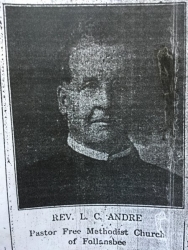
Rev. Arthur C. Palmer was the pastor of the church during 1917. He was then followed by Rev. L.C. Andre in 1922. In February of 1917, Rev. Arthur C. Palmer miraculously escaped from an assassination attempt which was then reported by the city newspaper. For further information on this event, see link below.
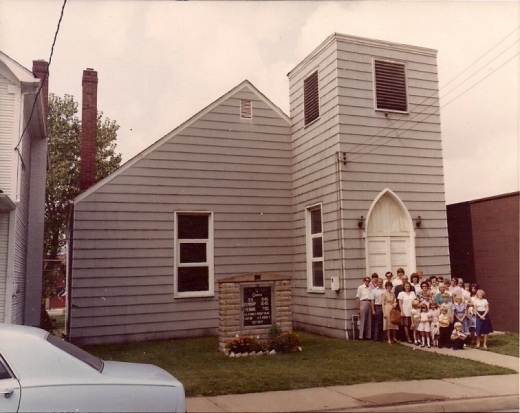
- *Follansbee Review, “Four Sermons,” Feb. 11, 1916, p. 1.
- Photos of Reverends Courtesy of- Follansbee Review
- *See on Timelne: Rev. Arthur C. Palmer’s Miraculous Escape.
Apr. 13, 1917 – Unusual Gavel Presented to Mayor Cox
The newly elected Mayor was presented with a huge wooden gavel by the Follansbee Brothers company. The presentation letter read in part, “This gavel made from two historic trees: that is to say, the cherry tree which George Washington cut down and the sour apple tree to which Jeff Davis was to hang, you will wield with good judgment and never in a haughty or dictatorial manner. Yours very respectfully, Follansbee Brothers Office Gang.”
- Follansbee Review, “Gavel Presented to Mayor Cox,” April 13, 1917, front page.
April 6, 1917 – Congress Declares War Against Germany
Patriotic demonstrations, parades, and appeals to support the war effort occurred across the nation. At a war rally meeting held in Wellsburg, Follansbee’s Attorney Robert L. Ramsay, called upon the crowd to renew their allegiance to the flag. “Fellow Citizens, at this time there should be no south, no north; no east, no west and no middle west, no republican, no democrat, only one America and all Americans… there is no question where the people of old Brooke county stand; we are ready to again renew our allegiance to the old flag, ready…. with our lives to defend the honor, the dignity and the life of our beloved Republic.”
In Follansbee, a big patriotic parade and flag raising occurred. A patriotic address was given by Mr. William U. Follansbee of the Follansbee Brothers company. The exercises were held on a vacant mill-office site, on the corner of Main and Penn streets. A 72-foot flag-pole was erected and every school child in the parade was given a small flag to wave.
Recruitment was already underway for all able-bodied male citizens under 35 of age who wanted to be in the military for the national defense. Among the first boys sent for military training to Fort Thomas, Kentucky, were Albert Millington, Fred Turner, James Stewart, Joseph Johnson, Charles Bell, John Leeper, George Budea, John Vicella and George Christian (Broncho Bill).
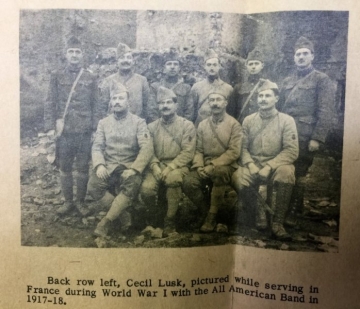
Photo Courtesy: Former Follansbee Mayor Tony Paesano
- Follansbee Review, “Resolution Declaring a State of War Passes….,” April 6, 1917, front page.
- Follansbee Review, “Recruiting for the Regular Army,” April 6, 1917, front page.
- Follansbee Review, “Renewing Allegiance to the Flag,” April 13, 1917, front page.
- Follansbee Review, “Big Patriotic Demonstration…,” April 20, 1917, front page.
- Follansbee Review, “Enlist for Military Training,” March 30, 1917, front page.
Feb. 2, 1917 – Rev. Palmer’s Miraculous Escape from Assassination
Pastor Palmer of the Free Methodist church escaped being killed while walking to his church located at the south end of Virginia avenue. While nearing Rose Alley, he noticed a tall man standing a little ways off. The man fired one shot, turned and fled. Rev. Palmer proceeded on his way ignorant that he had a close call. When he stopped at the post office, he noticed a hole in his overcoat. A 22 caliber bullet passed through his coat, lower side pocket, and into his bible. The bullet entered the Bible to the 12th chapter of Romans, against the first verse. The verse reads “I beseech you therefore, brethren, by the mercies of God, that ye present your bodies a living sacrifice, holy, acceptable to God…” Rev. Palmer had no idea why anyone would seek to injure him and thought it must have been a mistake.
- Follansbee Review, “Bullet Shot at Preacher Enters His Bible,” Feb. 2, 1917, front page.